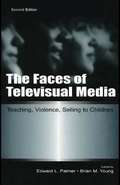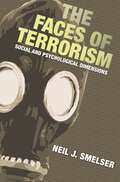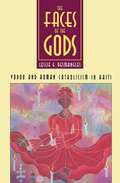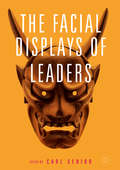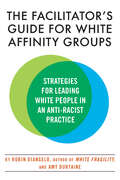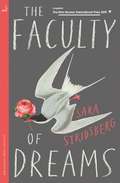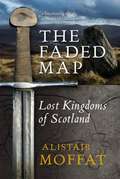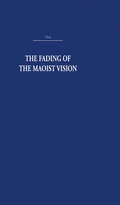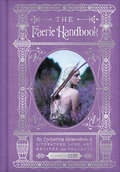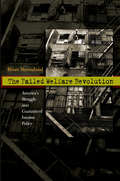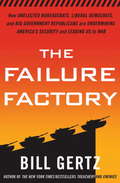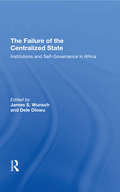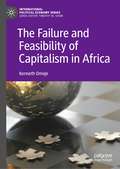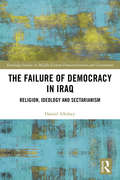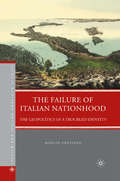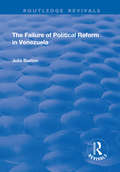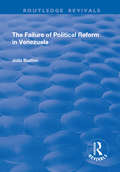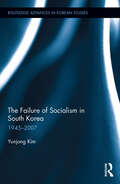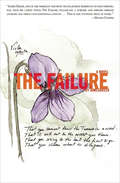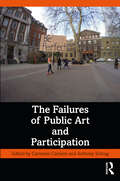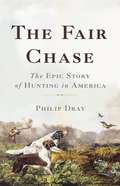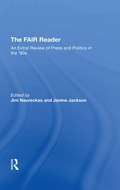- Table View
- List View
The Faces of Televisual Media: Teaching, Violence, Selling To Children (Routledge Communication Series)
by EDWARD L.PALMER and BRIAN M.YOUNGThis collection offers original, state-of-the-art contributions from leading authorities in children's televisual media. International researchers from communication and psychology provide readers with ready access to current televisual research, trends, and policymaking/political climate issues pertaining to children. This second edition provides a current summary of studies on content, viewing patterns, comprehension, effects, and individual differences in instructional and educational programming, televisual entertainment and violence programming, and televisual advertising to children. Editors Edward L. Palmer and Brian M. Young have structured the volume into three sections examining the "faces" of television: the Teaching (instructional/educational) Face, the Violent Face, and the Selling (advertising) Face. Chapters within each section identify and focus recurrent themes while integrating them topically into a coherent whole. Each area incorporates new technologies and considers their potentials, effects, and future. Subjects featured in the various chapters include: *cross-cultural and historical comparisons with an in-depth perspective on the BBC and other European/Asian televisual media roots, as well as America's formative televisual media roots; *an examination of key differences between developed and developing countries; *implications of emerging instructional/educational media for children's education--addressing both cognitive and multi-ethnic aspects; and * prominent, informed challenge to the prevailing popular view that children are unaffected and unharmed by exposure to media violence. This volume informs ongoing debates across a broad spectrum of current, critical issues, and suggests avenues for future research. It is pertinent and provocative for the most sophisticated scholar in the field, as well as for students in areas of developmental or social psychology, communication, education, sociology, marketing, broadcasting and film, public policy, advertising, and medicine/pediatrics. It is also appropriate for courses in children, media, and society.
The Faces of Terrorism: Social and Psychological Dimensions (Science Essentials #13)
by Neil J. SmelserTerrorism is the most clear and present danger we confront today, yet no phenomenon is more poorly understood by policymakers, the media, and the general public. The Faces of Terrorism is the first serious interdisciplinary examination of terrorism in all its facets. What gives rise to it, who are its proponents and how do they think, and how--and why--does it work? Neil Smelser begins by tackling the fundamental problem of defining what exactly terrorism is. He shows why a precise definition has eluded us until now, and he proposes one that takes into account the full complexities of this unconventional and politically charged brand of violence. He explores the root causes and conditions of terrorism, and examines the ideologies that inspire and fuel it throughout the world. Smelser looks closely at the terrorists themselves--their recruitment, their motivations, the groups they form, their intended audiences, and their uses of the media in pursuing their agendas. He studies the target societies as well, unraveling the complicated social and psychological impacts of having to cope with the ever-present threat of a terrorist strike--and responding when one occurs. He explains what it means to live under constant threat of terrorism, and addresses the thorny domestic and foreign policy challenges this poses. Throughout, Smelser draws from the latest findings in sociology, political science, anthropology, economics, psychology, psychiatry, and history. The Faces of Terrorism provides the breadth of scope necessary to understand--and ultimately eliminate--this most pressing global threat.
The Faces of the Gods
by Leslie G. DesmanglesVodou, the folk religion of Haiti, is a by-product of the contact between Roman Catholicism and African and Amerindian traditional religions. In this book, Leslie Desmangles analyzes the mythology and rituals of Vodou, focusing particularly on the inclusion of West African and European elements in Vodouisants' beliefs and practices.Desmangles sees Vodou not simply as a grafting of European religious traditions onto African stock, but as a true creole phenomenon, born out of the oppressive conditions of slavery and the necessary adaptation of slaves to a New World environment.Desmangles uses Haitian history to explain this phenomenon, paying particular attention to the role of the seventeenth- and eighteenth-century maroon communities in preserving African traditions and the attempts by the Catholic, educated elite to suppress African-based "superstitions." The result is a society in which one religion, Catholicism, is visible and official; the other, Vodou, is unofficial and largely secretive.
The Facial Displays of Leaders
by Carl SeniorThis book provides a multifaceted analysis of how the human face drives many of our most important social behaviors. People perceive the identities, genders, and attractiveness of others from the many different faces they see every day. There has been great deal of research on the psychology, neuropsychology and neuroscience of how these perceptions are formed. However the facial displays of leadership, with their almost ubiquitous role in our social lives, remain largely unexplored. Carl Senior argues that perhaps now more than ever, it is crucial to understand how facial displays communicate leadership abilities. This book brings together perspectives from a range of international experts across a variety of fields including social psychology, organisational sciences and the study of primates, with the aim to further our understanding of this fundamental social force. Scholars and professionals, as well as anyone interested in learning more about how the face is used to drive our perception of leadership, will find this book of great interest.
The Facilitator's Guide for White Affinity Groups: Strategies for Leading White People in an Anti-Racist Practice
by Dr. Robin DiAngelo Amy BurtaineA first of its kind, accessible, in-depth resource for leading effective white racial affinity groups—an essential tool in anti-racism for building the skills and perspectives needed for white people to challenge racism.While there are a few short articles and guides addressing the challenges and complexities of leading white affinity groups, there has never been a detailed handbook exclusively for white racial affinity group facilitators. There are many challenges in facilitating these groups including the need to have a deep theoretical understanding of racism; a high degree of racial self-awareness; sensitivity to and the ability to work with the range of skills and degrees of awareness participants bring; and strong facilitation and conflict resolution skills.The Facilitator&’s Guide for White Affinity Groups is the first in-depth guide for educators, mediators, workplace consultants and trainers, workplace diversity groups, community organizers, conference organizers, members of faith communities, and members of racial and social justice groups.Dr. Robin DiAngelo and Amy Burtaine, who collectively bring over 20 years of experience leading anti-racist education and racial affinity groups present:· a theoretical framework for understanding racism;· a case for the value of racial affinity groups as a tool for challenging racism;· guidelines for setting up affinity groups in a variety of contexts;· the skills and perspectives needed for effective facilitation;· scenarios to illustrate common challenges;· a glossary of definitions;· exercises, discussion prompts, and assessment tools.· an extensive list of common patterns and group dynamics and how to address themWritten accessibly for a wide range of readers and backgrounds, The Facilitator&’s Guide for White Affinity Groups will be an important reference for anyone committed to anti-racism work.
The Facility Manager's Guide to Safety and Security
by John W. HendersonA guide for facility managers of varying types of facilities including, apartment buildings/complexes, office buildings, retail stores, educational facilities (schools), restaurants, and countless others. It will look specifically at the physical similarities inherent in all buildings/facilities and delve into the operational/maintenance needs, access control, audit proceedures and emergency procedure requirements. It provides procedures and policy direction in facilities that are lacking such formalized doctrine and gives a starting point to run their facilities in a consistent manner with a focus on safety and security, as well as keeping control of liability risk.
The Faculty of Dreams: Longlisted for the Man Booker International Prize 2019
by Sara StridsbergIn April 1988, Valerie Solanas - the writer, radical feminist and would-be assassin of Andy Warhol - was discovered dead in her hotel room, in a grimy corner of San Francisco. She was only 52; alone, penniless and surrounded by the typed pages of her last writings.In The Faculty of Dreams, Sara Stridsberg revisits the hotel room where Solanas died, the courtroom where she was tried and convicted of attempting to murder Andy Warhol, the Georgia wastelands where she spent her childhood, where she was repeatedly raped by her father and beaten by her alcoholic grandfather, and the mental hospitals where she was interned.Through imagined conversations and monologues, reminisces and rantings, Stridsberg reconstructs this most intriguing and enigmatic of women, articulating the thoughts and fears that she struggled to express in life and giving a powerful, heartbreaking voice to the writer of the infamous SCUM Manifesto.
The Faded Map: Lost Kingdoms of Scotland
by Alistair MoffatDive into Northern Britain&’s Dark Ages in &“a book which gives a satisfying and convincing account of this little-known part of Scotland&’s history&” (Undiscovered Scotland). Modern communications have driven motorways and pylons through the countryside, dwarfed us with TV and telephone masts, and drastically altered the way in which we move around, see, and understand Scotland. Recent politics and logistics have established borders and jurisdictions which now seem permanent and impervious. The Faded Map looks beyond these to remember a land that was once quiet and green. Alistair Moffat&’s &“tireless research . . . and commanding knowledge&” bring to vivid life the half-forgotten kings and kingdoms of two thousand years ago, from the time of the Romans into the early medieval period (Scottish Field). In this &“fascinating&” account, Moffat describes the landscape these men and women moved through and writes of a Celtic society which spoke to itself in Old Welsh, where the Sons of Prophesy ruled, and the time when the English kings of Bernicia held sway over vast swathes of what is now Scotland (Alexander McCall Smith, author of Dream Angus). Heroes rode out of the mists to challenge them and then join with them, and the faint echo of the din of ancient battles can be heard as he takes the reader on a remarkable journey around a lost Scotland.
The Fading of the Maoist Vision: City and Country in China's Development
by Rhoads MurpheyFirst published in 1980.This book analyzes Chinese society and evaluates the achievements and failures of the Maoist ideology. The central theme is the urban and rural balance in China's development from the Revolution to the late twentieth century. The Fading of the Maoist Vision shows how the original Revolutionary blueprint was altered and the ways in which China has steered a different course from that charted by Mao as the ideological vision encountered an increasingly pressing set of economic realities. The book: · Is particularly valuable in setting China's achievements in the larger context of global ideas about the problems of national development and by comparing them to the experience of India in its pursuit of the Gandhian ideal.
The Faerie Handbook: An Enchanting Compendium of Literature, Lore, Art, Recipes, and Projects (The Enchanted Library)
by Carolyn TurgeonThis exquisite anthology welcomes you into an enchanted realm rich with myth, mystery, romance, and abounding natural beauty.Gorgeous fine art and photographs, literature, essays, do-it-yourself projects, and recipes provide hours of reading, viewing, and dreaming pleasure along with a multitude of ideas for modern-day living and entertaining with a distrinctive fairy touch.
The Failed Welfare Revolution: America's Struggle over Guaranteed Income Policy
by Brian SteenslandToday the United States has one of the highest poverty rates among the world's rich industrial democracies. The Failed Welfare Revolution shows us that things might have turned out differently. During the 1960s and 1970s, policymakers in three presidential administrations tried to replace the nation's existing welfare system with a revolutionary program to guarantee Americans basic economic security. Surprisingly from today's vantage point, guaranteed income plans received broad bipartisan support in the 1960s. One proposal, President Nixon's Family Assistance Plan, nearly passed into law in the 1970s, and President Carter advanced a similar bill a few years later. The failure of these proposals marked the federal government's last direct effort to alleviate poverty among the least advantaged and, ironically, sowed the seeds of conservative welfare reform strategies under President Reagan and beyond. This episode has largely vanished from America's collective memory. Here, Brian Steensland tells the whole story for the first time--from why such an unlikely policy idea first developed to the factors that sealed its fate. His account, based on extensive original research in presidential archives, draws on mainstream social science perspectives that emphasize the influence of powerful stakeholder groups and policymaking institutions. But Steensland also shows that some of the most potent obstacles to guaranteed income plans were cultural. Most centrally, by challenging Americans' longstanding distinction between the "deserving" and "undeserving" poor, the plans threatened the nation's cultural, political, and economic status quo.
The Failure Factory
by Bill GertzThe U. S. government is in crisis. The real power in America has shifted to a vast network of unelected officials whose authority has grown wildly out of control. In his latest blockbuster book, acclaimed defense and national-security reporter Bill Gertz exposes this group of astonishingly powerful leaders–and their enablers in the political class–and its devastating effect on America’s national security. Gertz names names of those who actively subvert official U. S. policy–including not only liberal Democrats but also a number of so-called Republicans who have joined this insidious “Blame America First” crowd. Based on scores of exclusive interviews and displaying the groundbreaking reporting that has made Bill Gertz’s previous books smash bestsellers,The Failure Factoryoffers a chilling look at the threats to our national security that exist within our own government. “Mr. Gertz makes some extremely important points. ” –The Washington Times “The hottest reporter in town . . . [Gertz] breaks dozens of stories every year. ” –The Washington Post
The Failure Of The Centralized State: Institutions And Self-governance In Africa
by John W Harbeson Dele Olowu James Wunsch Vincent OstromThis book is an outcome of the workshop on Political Theory and Policy Analysis, held in Indiana, during the 1985/86. It seeks to explains why the centralized African state has failed and discusses the breakdown of social processes indirectly caused by the policies of the centralized state.
The Failure and Feasibility of Capitalism in Africa (International Political Economy Series)
by Kenneth OmejeThis book argues that capitalism has practically failed to deliver the long-desired economic transformation and inclusive development in postcolonial Africa. The principal factor that accounts for this failure is the prolific non-productive forms of capitalism that tend to be dominant in the African continent and their governance dimensions. The research explores how and why capitalism has failed in the African context and the feasibility of turning it around. The book meets the demands of diverse audiences in the fields of International Political Economy, Development Economics, Political Science, and African Studies. The author adopts an unconventional narrativist approach that makes the book amenable to general readership.
The Failure of Democracy in Iraq: Religion, Ideology and Sectarianism (Routledge Studies in Middle Eastern Democratization and Government)
by Hamid AlkifaeyThe Failure of Democracy in Iraq studies democratization in post-2003 Iraq, which has so far failed, due mainly to cultural and religious reasons. There are other factors, such as the legacy of the dictatorial regime, exclusionary policies, the problem of stateness, interference by regional powers, the rentier economy and sectarianism, that have impeded democracy and contributed to its failure, but the employment of religion in politics was the most to blame. The establishment of stable democratic institutions continues to elude Iraq, 15 years after toppling the dictatorship. The post-2003 Iraq could not completely eradicate the long historical tradition of despotic governance due to deep-seated religious beliefs and tribal values, along with widening societal ethno-sectarian rifts which precluded the negotiation of firm and stable elite settlements and pacts across communal lines. The book examines how the fear in neighbouring countries of a region-wide domino effect of the Iraq democratization process caused them to adopt interventionist policies towards Iraq that helped to stunt the development of democracy. The lack of commitment by the initiator of the democratic process, the United States, undermined the prospects of democratic consolidation. This is compounded by serious mistakes such as de-Ba’athification and the disbanding of the Iraqi army and security apparatuses which caused a security vacuum the US forces were not able to fill. The Failure of Democracy in Iraq is a key resource for all students and academics interested in democracy, Islam and Middle East Studies.
The Failure of Italian Nationhood
by Manlio GrazianoThis book provides a political, economic, sociological, and cultural history of Italy that looks at its difficulties with the task of nation-building.
The Failure of Land Reform in Twentieth-Century England: The Triumph of Private Property
by Michael TichelarBased on a mixture of primary historical research and secondary sources, this book explores the reasons for the failure of the state in England during the twentieth century to regulate, tax, and control the market in land for the common or public good. It is maintained that this created the circumstances in which private property relationships had triumphed by the end of the century. Explaining a complex field of legislation and policy in accessible terms, the book concludes by asking what type of land reform might be relevant in the twenty-first century to address the current housing crisis, which seen in its widest context, has become the new land question of the modern era.
The Failure of Political Reform in Venezuela (Routledge Revivals Ser.)
by Julia BuxtonThis title was first published in 2001. The victory of former lieutenant colonel Hugo Chavez in the Venezuelan presidential elections of 1998 was criticized as a blow against the country's deep-seated democratic tradition. It is claimed that this simplistic argument fails to recognize the extent of democratic deterioration in the country and the limitations imposed by discredited political actors on a meaningful democratic reform process. The book aims to break new ground in providing unseen evidence of electoral fraud and offers a fresh perspective on the nature of democratic development.
The Failure of Political Reform in Venezuela (Routledge Revivals)
by Julia BuxtonThis title was first published in 2001.The victory of former lieutenant colonel Hugo Chavez in the Venezuelan presidential elections of 1998 was criticized as a blow against the country's deep-seated democratic tradition. It is claimed that this simplistic argument fails to recognize the extent of democratic deterioration in the country and the limitations imposed by discredited political actors on a meaningful democratic reform process. The book aims to break new ground in providing unseen evidence of electoral fraud and offers a fresh perspective on the nature of democratic development.
The Failure of Socialism in South Korea: 1945-2007 (Routledge Advances in Korean Studies)
by Yunjong KimDespite the fact that socialist parties have proved to be a major political force across the world, this has not been the case in Asian countries. Socialism in South Korea is a quintessential example of this failure. Despite the existence of a socialist party and what would seem to be the right conditions for development, the Korean socialist tendency has failed to become a meaningful force in politics. This book explores why and under what conditions Korean socialism has failed to develop into a social democrat movement in the post-war period. Within the context of the integration of structural and agency factors, it goes beyond the generally accepted view that the left failed because of suppression by the state and proffers that the real reason why socialism failed lay with its inability to develop beyond revolutionary socialism and build a more pragmatic social democracy that could develop a broad alliance within Korean society. Also drawing on examples from Western Europe and Latin America, where left-wing forces have achieved power, this book will be of huge interest not only to students and scholars of Asian and Korean politics, but also socialism, comparative and international politics alike.
The Failure: A Novel
by James GreerThe Failure is a picaresque novel set in Los Angeles about two guys who conceive and badly execute a plan to rob a Korean check-cashing store in order to finance the prototype for an impossibly ridiculous Internet application."James Greer, one of the nimblest and most multilayered American fiction writers, has, with his latest novel The Failure, pulled off a sublime and shivery-smooth literary hat-trick-cum-emotional-gotcha. I defy anyone to come up with an equation to explain how this book's first impression as a ridiculously clever, funny crime story can gradually disclose a metanovel built from far more encyclopedic scratch only to reveal upon its conclusion a central, overriding thought so heartfelt literally it trembles your lower lip. This is one stunning piece of work." --Dennis Cooper, author of Ugly Man"James Greer's The Failure is such an unqualified success, both in conception and execution, that I have grave doubts he actually wrote it." --Steven SoderberghJames Greer is the author of the novel Artificial Light (Akashic Books), which won a California Book Award for Best Debut Novel, and the nonfiction book Guided By Voices: A Brief History (Grove Press), a biography of the band for which he once played bass guitar. He is currently working with director Steven Soderbergh on a rock musical about Cleopatra starring Catherine Zeta-Jones. He lives in Los Angeles.
The Failures of Public Art and Participation
by Cameron Cartiere Anthony SchragThis collection of original essays takes a multi-disciplinary approach to explore the theme of failure through the broad spectrum of public art and social practice. The anthology brings together practicing artists, curators, activists, art writers, administrators, planners, and educators from around the world to offer differing perspectives on the many facets of failure in commissioning, planning, producing, evaluating, and engaging communities in the continually evolving field of art in the public realm. As such, this book offers a survey of currently unexplored and interconnected thinking, and provides a much-needed critical voice to the commissioning of public and participatory arts. The volume includes case studies from the UK, the US, China, Cuba, and Denmark, as well as discussions of digital public art collections. The Failures of Public Art and Participation will be of interest for students and scholars of visual arts, design and architecture interested in how art in the public realm fits within social and political contexts.
The Fair Chase: The Epic Story of Hunting in America
by Philip DrayAn award-winning historian tells the story of hunting in America, showing how this sport has shaped our national identity.From Daniel Boone to Teddy Roosevelt, hunting is one of America's most sacred-but also most fraught-traditions. It was promoted in the 19th century as a way to reconnect "soft" urban Americans with nature and to the legacy of the country's pathfinding heroes. Fair chase, a hunting code of ethics emphasizing fairness, rugged independence, and restraint towards wildlife, emerged as a worldview and gave birth to the conservation movement. But the sport's popularity also caused class, ethnic, and racial divisions, and stirred debate about the treatment of Native Americans and the role of hunting in preparing young men for war. This sweeping and balanced book offers a definitive account of hunting in America. It is essential reading for anyone interested in the evolution of our nation's foundational myths.
The Fair Reader: An Extra! Review Of Press And Politics In The '90s
by Jim Naureckas Janine JacksonWhy did major news outlets virtually ignore the only cost-effective plan for universal health care coverage—even though polls showed the plan had majority support? Why did leading journalists go out of their way to attack Bill Clinton’s rivals in the 1992 Democratic primary—while focusing unprecedented attention on Clinton’s personal life? Why do establishment media consider falling unemployment to be bad news? In the tradition of I.F. Stone and George Seldes, the contributors to The FAIR Reader probe the often mysterious connections between press and politics in the 1990s. The essays are filled with startling information about the critical issues of our time—from the Gulf War and the Clarence Thomas hearings to the debates over health care reform and NAFTA—documenting the deceptive, one-sided mainstream reporting that leaves the public in the dark. Particular attention is paid to the election of 1992 and the Clinton administration, showing how the media promoted, undercut, and finally shaped Clinton to fit a media agenda, the book demonstrates that systematic media bias poses a threat to the democratic process and the free flow of information to the U.S. citizenry. FAIR, founded in 1986, is the national media watch group dedicated to the principle that independent, aggressive, and critical media are essential to an informed democracy. In the nine years since FAIR was launched, it has gained national recognition for its well-documented studies of media bias, its challenge to powerful media figures like Rush Limbaugh, and its award-winning journal of media criticism and politics, Extra!. The FAIR Reader collects Extra!’s most incisive reporting on journalism and politics in the ‘90s. It will be invaluable to anyone interested in decoding the media agenda behind the daily news.
The Fair Sex: White Women and Racial Patriarchy in the Early American Republic
by Pauline E. SchloesserChoice Outstanding Academic Title 2002 Once the egalitarian passions of the American Revolution had dimmed, the new nation settled into a conservative period that saw the legal and social subordination of women and non-white men. Among the Founders who brought the fledgling government into being were those who sought to establish order through the reconstruction of racial and gender hierarchies. In this effort they enlisted “the fair sex,”&#—white women. Politicians, ministers, writers, husbands, fathers and brothers entreated Anglo-American women to assume responsibility for the nation's virtue. Thus, although disfranchised, they served an important national function, that of civilizing non-citizen. They were encouraged to consider themselves the moral and intellectual superiors to non-whites, unruly men, and children. These white women were empowered by race and ethnicity, and class, but limited by gender. And in seeking to maintain their advantages, they helped perpetuate the system of racial domination by refusing to support the liberation of others from literal slavery. Schloesser examines the lives and writings of three female political intellectuals—;Mercy Otis Warren, Abigail Smith Adams, and Judith Sargent Murray—;each of whom was acutely aware of their tenuous position in the founding era of the republic. Carefully negotiating the gender and racial hierarchies of the nation, they at varying times asserted their rights and demurred to male governance. In their public and private actions they represented the paradigm of racial patriarchy at its most complex and its most conflicted.
